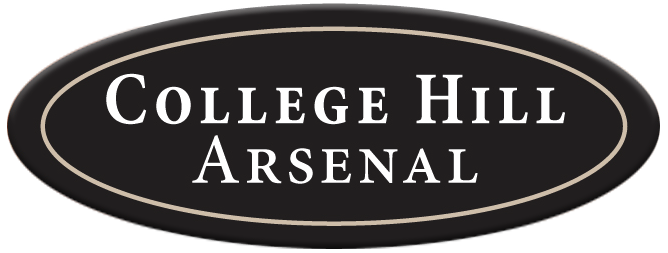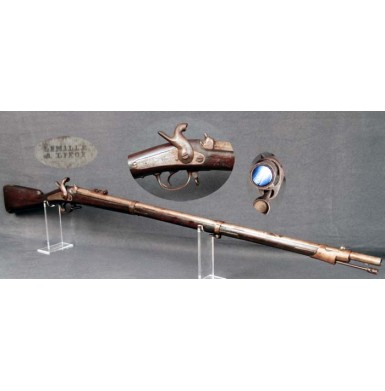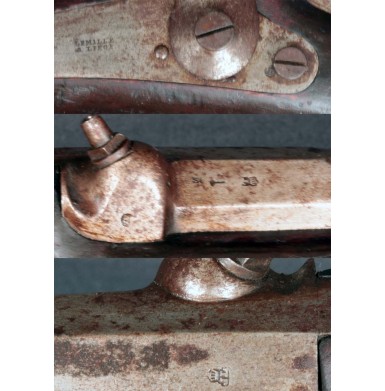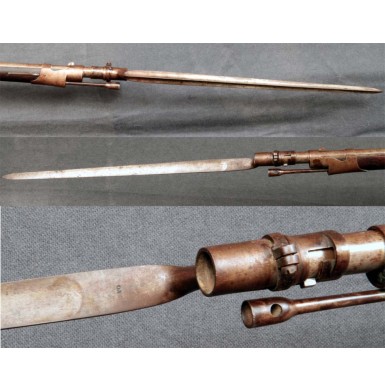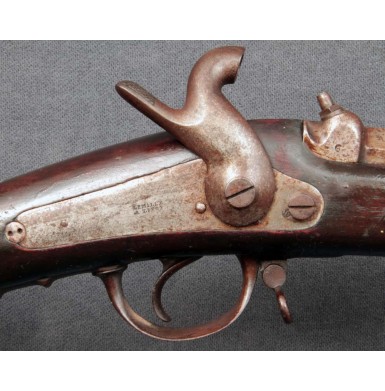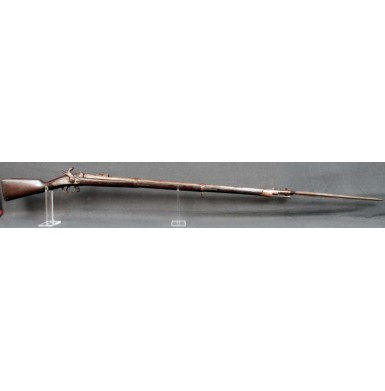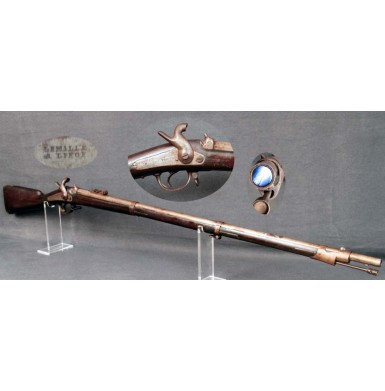Belgian Made .58 Rifle Musket & Bayonet - Scarce
- Product Code: FLA-1829-SOLD
- Availability: Out Of Stock
-
$1.00
This is a FINE condition example of a very scare imported rifle musket that saw use during the American Civil War. The gun is referred to in “Firearms From Europe “ 2nd Edition” as the “French .58-Caliber Rifle Musket”, but that name (as the authors indicate in the text) is somewhat misleading as the gun only is only French in appearance, and was in fact a product of Li’ge, Belgium. Externally the gun appears to be a French M-1857 Light Infantry Rifle Musket, but instead of being the standard French .70-caliber, the gun is .58 caliber. The fact that the rifle musket is .58-caliber allowed it to be classified as a “1st Class’ arm by the US Ordnance Department. Although most French and Belgium long arms are lumped together on US Ordnance returns simply as “muskets”, “rifles’ or “rifle muskets”, the prices paid for the arms can help determine the quality and type of weapon that is being referred to. The lower quality import arms, especially obsolete and large caliber smoothbore weapons, tended to be priced a around $8 to $12 each. Higher quality, current production, rifled arms in .54-.58 caliber (like the P-1853 Enfield and the Austrian M-1854 Lorenz) were usually priced between $15 and $25 each, depending on pattern and condition. According to US Ordnance Department records, arms contractor and importer John Pondir delivered 3,241 “French Rifle Muskets’ to the US Government between January 10 and March 28 of 1863, at prices that ranged from $20.16 to $24.96 each. The price paid, combined with the description as “rifle muskets’ implies that these were 1st Class, .58 rifled long arms of the pattern offered here. The rather late delivery date indicates that the guns were most assuredly “1st Class”, as all contracts for imported arms were cancelled in July of 1863, and by the first quarter of 1863 the need for long arms was not so extreme that the US Government would be willing to pay 2 to 3 times the going rate for large caliber 2nd or 3rd class muskets.
Externally, the Belgian Made .58 Caliber Rifle Muskets were nearly identical to the French M-1857 Light Infantry rifle muskets. The guns were 56” in overall length, with a 40.5” round barrel in .58 caliber, rifled with 4 grooves. The barrel was secured to the stock with three flat barrel bands, with the upper one being double-strapped, and a single tang screw. The rifle muskets utilized a back-action lock, like all French pattern long arms of the period, which was secured by a single lock bolt at the front, that passed through the stock to metal escutcheon on the opposite side. A spanner screw secured the rear of the lock. The guns had a ladder style, long-range rear sight that resembled that found on the P-1853 Enfield rifle musket. The front sight was an iron blade attached to the barrel, directly behind the front strap of the upper band. A bayonet stud was located just off center of the bottom of the barrel, to allow the mounting of an 18” bladed socket bayonet that very closely resembled the French M-1847, with exception of the size of the socket. The guns were finished in the “bright” with iron furniture and a French pattern ramrod with heavy tip and a torque hole. A sling swivel was attached to the front of the triggerguard bow and the middle barrel band. Like other Belgian produced arms, the guns not only resembled French pattern muskets, but also the scarce “Dresden” or “Saxon” pattern rifle muskets that were quite similar, with the exception of having a unique double-strapped middle barrel band.
This Belgian Made .58 Caliber Rifle Musket is in FINE condition overall. The gun is 100% complete and correct and retains its original and very scarce socket bayonet as well. The gun is mechanically excellent and the lock functions perfectly on all positions. The gun is quite crisp and sharp throughout and is relatively untouched. The metal has a thin, smooth brown patina over all of the surfaces, with only some small, scattered patches of light oxidized discoloration. The metal is almost entirely smooth, the exception of a couple of small oxidized patches on the barrel, some scattered light pinpricking on the barrel and furniture, and the moderately oxidized and somewhat crusty buttplate. The bore of the rifle musket is VERY FINE and is mostly bright, with only some small patches of darkness and some light scattered pitting in the grooves. The rifling is crisp and sharp throughout and the condition of the bore indicates it would most likely shoot very accurately. The back action lock is clearly marked in two lines, behind the hammer LE MILLE / A LIEGE. Le Mille was a major arms producer in the Belgian gunmaking center of Li’ge. The surface of the gun bears a variety of typical Belgian proof and inspection marks on the barrel and the bolster, as well as a number of assembly, proof and inspection under the barrel. The gun retains the original long-base ladder rear sight, both original sling swivels and the original ramrod, which is full-length and retains fine threads at the end. The threads accept a standard .58 caliber US bore wiper. The stock of the gun is in about FINE condition as well. The stock is full-length with no breaks. There may be a small repaired crack along the upper edge of the mortise, above the lock. However, the stock does have an old, light layer of varnish on it, and the possible glued crack may in fact be some pooled varnish. Even under extremely intense light I could not determine if it was a repaired hairline crack or varnish. In either case, it is truly minor, but is mentioned for accuracy. Otherwise, the stock shows only the normal light bumps and dings from handling and use. The wood to metal fit is quite good and the stock is really in rather crisp condition. Even the ramrod channel remains relatively crisp, with little wear. There are a few minor splatters of old paint visible on the stock, but these could be cleaned off with little effort, if the new owner decided to do so. The paint splotches are typical of many attic found muskets, that were not even thought valuable enough to move when a home was painted 100 years ago! The gun retains its original socket bayonet, which has a pleasing brown patina, which matches the gun perfectly. Clearly the two pieces have been together a very long time and quite possibly since the war. The bayonet is full length, retains its original and fully functional locking ring, and fits the musket perfectly.
Overall this is a really crisp and wonderful example of a very scarce Civil War imported rifle musket. With only 3,241 of these guns imported, they are not often encountered and are rarely available for sale. I collected Civil War import infantry arms for many years before I became a dealer, and I have never had the opportunity to own one of these scarce .58 Belgian rifle muskets, nor can I remember seeing one for sale for at least 10 years (although my memory is questionable at times”.). For any collector of Civil War import arms, this is almost certainly a gun that is not in your collection and would be a fantastic addition to display with a more common French pattern musket or rifle musket in .70. If I were still collecting, this is a gun I would keep, as its sharp and essentially untouched condition make it a really desirable piece to own. The socket bayonet is an even bigger bonus. The condition of the bore would likely make this gun a real tack driver on the firing line at an N-SSA match. No matter what part of the gun appeals to you, the rarity, the condition or the fact that it is an import arm, it will be a fantastic addition to your collection.
SOLD